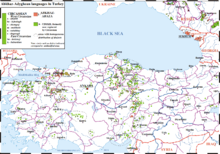Cabardines
The Kabardians ( Kabardian Къэбэртаехэр , Russian Кабардинцы ) are an official nationality ( titular nation ) in Russia. Originally they are the numerically largest tribe of the Circassians . The boundaries of the official nationality (titular nation) and the historical tribe are not exactly the same, there are also some tribesmen of the Kabardines who belong to other Circassian nationalities in Russia and numerous tribesmen in the Circassian diaspora in Turkey and other Middle Eastern countries.
In contrast to the other Circassian tribes, who previously lived statelessly, the Kabardines had their own principality Kabarda (Kabardei) from the 15th century to 1825 , to which only smaller groups who migrated to the west did not belong.
Traditionally, the Kabardines live from agriculture and cattle breeding, the horse breed Kabardiner is named after them. The majority of the Kabardines are Sunni Muslims , while a small minority in the East are Orthodox Christians .
A cabardian popular in Russia is the singer Sati Kazanova of the Fabrika group .
Official nationality (titular nation)
The nationality ( titular nation ) of the Kabardines live mainly in the Russian republic of Kabardino-Balkaria in the North Caucasus , where they make up about 57.2% of the population (490,453 people in 2010). Across Russia, there were 516,826 Cabardians living at the 2010 census. There is also a small minority in the eastern neighboring Russian Republic of North Ossetia-Alania .
The nationality (titular nation) of the Kabardians use the Kabardian language as written language , which was formed from their dialect in the 20th century. It is the official language in Kabardino-Balkaria, but also in the neighboring Republic of Karachay-Cherkessia . In addition to the Adygeic language , it is one of the established written languages from dialects of the Circassians , which has been written with the Cyrillic script since the late 1930s . The oral dialect belongs next to that of the neighboring Circassian tribe of Beslenejer (who also use the Kabardian written language) to the phonetically somewhat simpler Eastern Circassian dialects.
From 1944 to 1957, the Kabardines had the Cabardine Autonomous Soviet Socialist Republic within the Soviet Union because the neighboring Balkar nationality was exiled to Central Asia on Stalin's orders at this time .
Historical tribe
Originally, the Kabardines did not form a nationality (titular nation) established in Soviet times, but a large Circassian tribe. There are also members of this tribe in Karachay-Cherkessia and Adygeja , but they are counted among the titular nations "Circassians" or "Adygejer". Those in Adygea even have to use the Adygeic written language. In addition, since the deportation in 1864 at the end of the Caucasus War there have been numerous members of the Diaspora states , probably more than stayed in Russia.
Myths
Like other Caucasian mountain peoples, the Carbardines have "myths about stone births which are manifested in the idea of a rebellious hero born out of a stone or mountain ( Narten epic)". The Kabardian national epic tells the legend of the heroes Sosruko and Badynoko.
literature
- AM: Caucasian civilization . In: The Gazebo . Issue 29, 1867, pp. 459–461 ( full text [ Wikisource ] - illustrated).
Web links
- The Carbardines and the Balkars Report from the radio station "Voice of Russia"
Individual evidence
- ^ Results of the 2010 Census of Russia , Excel table 7, line 471.
- ↑ Excel table 5, line 79 .
- ↑ Ilham Gadjimuradov: The Caucasus - a geographical, cultural or ethnic term? Memories of natural religions in the Caucasus .
- ↑ The blank shield, Kabardian heroic sagas . Publishing House Culture and Progress, Berlin 1958; taken from the volume "Kabardinisches Nartenepos" published by the Kabardinisches Scientific Research Institute.



